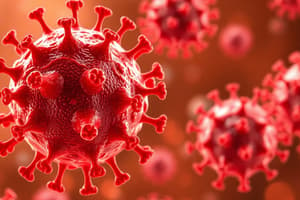Podcast
Questions and Answers
What is the study of the reactions of a host when foreign substances are introduced into the body?
What is the study of the reactions of a host when foreign substances are introduced into the body?
- Seroogy
- Hepatology
- Cardiology
- Immunology (correct)
What is the term for a foreign substance that induces an immune response?
What is the term for a foreign substance that induces an immune response?
- Antibody
- Hapten
- Immunogen
- Antigen (correct)
What is the term for a process by which a host organism protects itself from attacks by external and internal agents?
What is the term for a process by which a host organism protects itself from attacks by external and internal agents?
- Immunology
- Seroogy
- Immunity (correct)
- Hepatology
What is the term for a vasoactive amine released from mast cells and basophils during an allergic reaction?
What is the term for a vasoactive amine released from mast cells and basophils during an allergic reaction?
What is the term for a low molecular weight substance that can bind to an antibody once it’s formed?
What is the term for a low molecular weight substance that can bind to an antibody once it’s formed?
What type of immunity is the ability of an individual to resist infections by means of normally present body functions?
What type of immunity is the ability of an individual to resist infections by means of normally present body functions?
What is the primary characteristic that distinguishes adaptive immunity from innate immunity?
What is the primary characteristic that distinguishes adaptive immunity from innate immunity?
Which type of immunity involves the production of antibodies by the host?
Which type of immunity involves the production of antibodies by the host?
What is the purpose of the serology section in a laboratory?
What is the purpose of the serology section in a laboratory?
Why are serum separator tubes not used in certain serological tests?
Why are serum separator tubes not used in certain serological tests?
What is the difference between natural active immunity and artificial active immunity?
What is the difference between natural active immunity and artificial active immunity?
What is the primary difference between active and passive immunity?
What is the primary difference between active and passive immunity?
What does the presence of antinuclear antibody (ANA) indicate?
What does the presence of antinuclear antibody (ANA) indicate?
Which test is used to confirm syphilis?
Which test is used to confirm syphilis?
What does C-reactive protein (CRP) indicate when levels are increased?
What does C-reactive protein (CRP) indicate when levels are increased?
Which test is used to screen for Human Immunodeficiency Virus (HIV)?
Which test is used to screen for Human Immunodeficiency Virus (HIV)?
What does the presence of Rheumatoid factor (RF) indicate?
What does the presence of Rheumatoid factor (RF) indicate?
What does the presence of Hepatitis B surface antigen indicate?
What does the presence of Hepatitis B surface antigen indicate?
Flashcards are hidden until you start studying
Study Notes
Serology and Immunology
- Serology is the study of non-cellular portion of the blood, known as serum, and tests in this section detect the presence of antibodies to bacteria, fungi, parasites, viruses, and autoimmune disorders.
Bacterial Studies
- Antinuclear antibody (ANA) detects autoimmune disorders such as systematic lupus erythematosus
- Antistreptolysin O (ASO) titer indicates streptococcal infection
- Cold agglutinins checks cases of atypical pneumonia
- Febrile agglutinins shows presence of antibodies to specific organisms
- FTA-ABS confirms syphilis
- Rapid plasma reagin (RPR) indicates syphilis, but needs confirmation
- Rheumatoid factor (RF) indicates rheumatoid arthritis
Viral Studies
- Anti-HIV screens for Human immunodeficiency virus
- Cytomegalovirus antibody (CMV) is a confirmation test
- Epstein-Barr Virus checks for presence of heterophil antibody which indicates infectious mononucleosis
- Hepatitis B surface antigen checks for presence of hepatitis antigen in the surface of red cells
General Studies
- C-reactive protein (CRP) indicates inflammation when levels are increased
- Human chorionic gonadotropin (HCG) tests are present when the patient is pregnant
Immunology
- The study of the reactions of a host when foreign substances are introduced into the body
- A foreign substance that induces an immune response is called an antigen
- Immunology as a science has its roots in the study of immunity, the condition of being resistant to infection
Terminologies
- Antigen (Ag): foreign substance that stimulates antibody production
- Antibody (Ab): immunoglobulin produced by plasma cells in response to antigen
- Histamine: vasoactive amine released from mast cells & basophils during allergic reaction
- Hapten: low molecular weight substance that can bind to antibody once it’s formed
- Immunogen: any substance capable of inducing immune response
Types of Immunity
- Innate/Natural/Non-adaptive/Non-specific immunity: ability of an individual to resist infections by means of normally present body functions
- Acquired/Adaptive/Specific immunity: host response to foreign agents that depends on T and B lymphocytes and is characterized by specificity, memory, and recognition of self versus non-self
Sample Collection and Handling
- Blood for serological testing is collected in tubes with red stoppers
- Serum separator tubes are not used when the gel will interfere with the antigen-antibody reactions
Studying That Suits You
Use AI to generate personalized quizzes and flashcards to suit your learning preferences.




